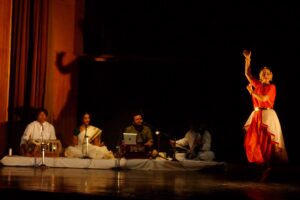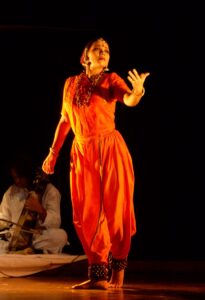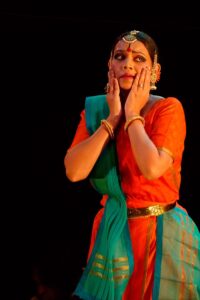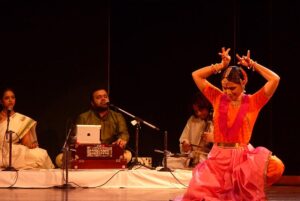Aatish-e-Ishq
- Bharatanatyam by Sneha Chakradhar
- Sufi Vocals by Dhruv Sangari
- Original Baramasa Poetry by Prof. Ashok Chakradhar
Duration: 1 hour
Accompanying Artists
- Tabla: Amjad Khan
- Sarangi: Kashif Ahmed
- Nattuvangam: Radhika Kathal
- Lighting Design: Deepa Dharmadhikari
- Costumes: Sandhya Raman
- Choreography: Sneha Chakradhar
- Music composition: Dhruv Sangari
Related links
Statesman review by Manjari Sinha.
Aatish-e-Ishq video preview on YouTube.
Performance overview
This dance presentation is a unique collaboration, a true representation of syncretism and synthesis in the Indian classical arts. The temple dance of Southern India walks the path of Mysticism, hand in hand with the Spiritual music of the Sufi shrine. A momentous meeting indeed!
Sharing common aesthetic and poetic registers, musical modes, grammar and sensibilities, two forms inhabiting vastly different worlds, come together in the universe of classicism, intensely engaging, weaving together ideas, structures and emotions.

Baramasa is a conceptual construct of visual art and poetry depicting life, love and longing in the Indian subcontinent through the cycle of six seasons spread over twelve months.This device has been used by Sufi and Bhakti saints to express their mystical musings and spiritual discourse for over a thousand years.
Aatish-e-Ishq, or the ‘Fire of Love’, burns in the being of the nayika, the heroine each day of the month and each month of the year. Pining for her beloved, every passing season brings forth a new facet to her yearning. Seasonal shifts and changing ecological imagery, create new experiences to her state of suffering.
Video preview of the performance
O sakhi, my confidant, she laments, “the fire of love burns bright all twelve months. From ash a spark, from ember a flame…”
Beginning with spring, a ruthless shower of Kamadeva’s arrows torments her. Her suffering is further exacerbated by seeing nature in bloom and living beings in union.
In summer, the suns relentless assault is unbearable. A drink of water may relieve the parched throat but what will quench the desire for union with the beloved? The nayika has become a laughing stock for those whose lovers have returned home.
Lo, the dark grey clouds have arrived. They bring with them a renewed hope. As thunder claps and the drops begin to fall, all of nature dances in celebration. But the nayika’s body burns with passion and the rain drops turn to steam upon contact with her flesh. The constant drum rolls of lightening instill in her a fear and eyes have storm of their own brewing in them. The beloved, she contemplates, has forgotten her.
The poet Kalidasa describes sharada as the season of ripening. The earth resembles a beautiful bride and the cool rays of the full moon of sharada purnima ignite in the heroine a deep yearning for Krishna. All the lovers gather to dance with the beloved, but the dusky flautist is nowhere to be found.
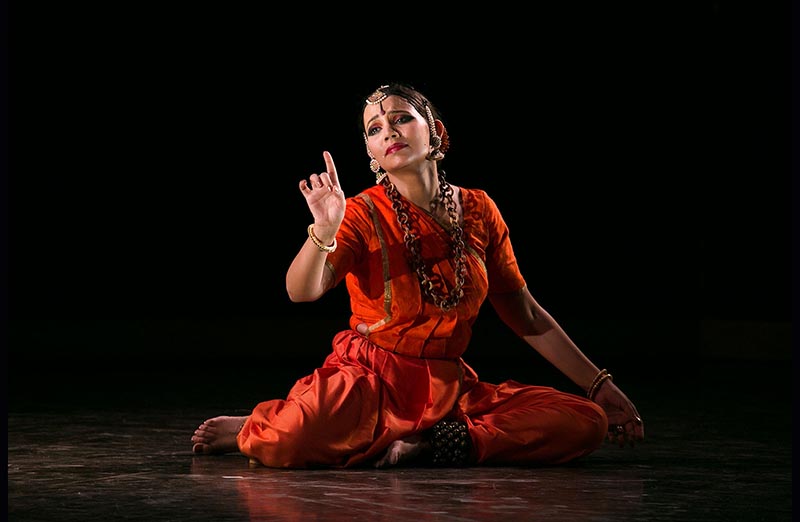
As fall looms, nature sheds its colourful beauty. One by one the leaves fall to the earth. The trees stand denuded, derobed. The wind whistles through the wilderness, but ride not on it the nayika’s pleas to the beloved. The sleepless night bears witness as ankle bells accompany her restless song.
Oh the irony of separation. The body shiver in the frost of winter, but inside, the soul burns in agony. The hearth fire only serves to fan the flames within. Radha dances lost, in solitude. “O friend, what’s keeping Krishna?”
And finally after an entre cycle of seasons has passed, the hero arrives. The nayika exclaims:
“This cycle of my suffering has finally come to a close… Krishna has appeared. As he lifts my veil, I stand in disbelief. He plays holi with me. He drenches me with his fountain gun; his hands smear my body with colour. As the moment of my dreams becomes reality, I belong completely to him.
Hear me now o mountain bearer, o giridhari, I too have borne a mountain of suffering in your absence. The seasons mocked me as I yearned for you, as I burned in your love. Come now; sit beside me. Let me fill my sight with your visage.
O sakhi, my confidant…the fire of love burns bright all twelve months.
From ash a spark, from ember a flame…Love dances, the beloved dances, I dance, you dance, the seasons, all twelve months dance, the cosmos dances… The flame of love dances eternally.”

